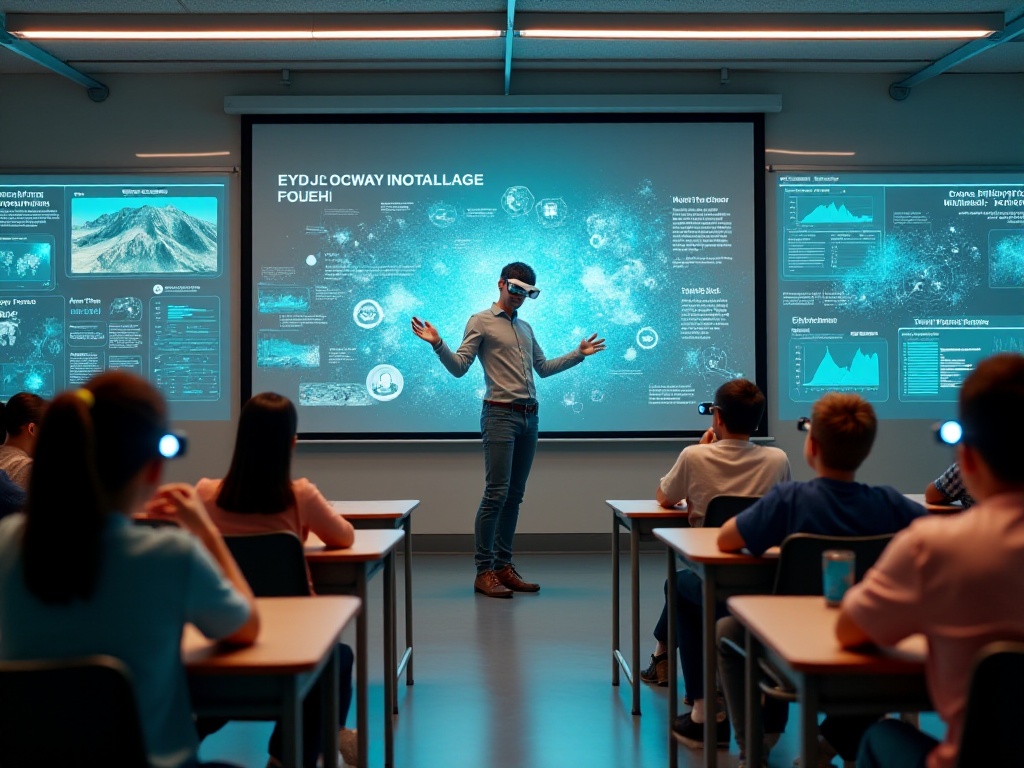Opening Thoughts
Last night while lying in bed scrolling through my phone, I suddenly realized how dramatically my learning methods had changed without me noticing. I remember in high school, I used to painfully memorize thick vocabulary books, writing words over and over again - a feeling I can't forget. But now? Opening Duolingo on my phone, learning through AI conversations feels as natural as chatting. Sometimes I even forget I'm "studying" because the process is so engaging.
Last week while learning Japanese on Duolingo, the AI not only provided precise pronunciation corrections but also created interesting scenarios to help me remember. For example, when learning the word "コーヒー" (coffee), the AI created a dialogue scenario of ordering at a Japanese coffee shop. Through this immersive learning, I unconsciously picked up many daily expressions.
As an ordinary student, my learning experience is probably similar to many others. But since I started incorporating AI into my studies, I've discovered how learning can become so effortless and natural. Today, I want to share my personal experience about how AI has transformed my way of learning.
Smart Assistant
Honestly, looking back now, I can't imagine days without an AI assistant. Every morning when I open my eyes, I habitually say to Siri, "Good morning, what do I need to do today?" Siri then responds in a gentle voice with my daily schedule: "You have calculus at 10 AM, a library meeting with your project group at 3 PM, and office hours with Professor Wang at 7 PM." Such reminders keep my life well-organized.
Moreover, the AI assistant provides thoughtful suggestions based on my schedule patterns. For instance, noticing a long break between my morning classes, it would suggest: "Consider bringing lunch to eat in the building's rest area before your next class - this will give you more time." When I'm too absorbed in assignments, it reminds me to take breaks or stay hydrated.
I remember once when I was rushing to finish an important paper and needed a quiet place to write. I casually asked my phone, "Help me find a good study spot nearby." The AI assistant immediately recommended several options: not only did it tell me the locations of the nearest libraries and cafes, but thoughtfully added, "The third floor study room in the library isn't crowded now, and the window seats have perfect lighting for long sessions; if you want coffee, try the Starbucks on Chunxi Road - the corner spots on the second floor are quiet and have plenty of outlets."
This experience is like having a thoughtful friend always by my side. It not only understands my needs but can provide the most suitable suggestions based on real-time conditions. Sometimes I think, this isn't just a cold machine - it's more like my personal assistant!
There was another particularly interesting experience when I was preparing for a final exam in an elective course and complained to my AI assistant about not knowing where to start. It immediately created a detailed review plan: first mapping out the course outline with a mind map, then prioritizing topics and allocating appropriate review time for each concept. Even more thoughtfully, it would adjust the plan based on my progress to ensure I could review all key points before the exam.

Learning Assistant
Speaking of writing, I really must praise Grammarly, the AI writing assistant. It's like having an always-available English teacher, patiently helping me improve my writing. Last year when I was writing an English paper about environmental protection, I revised just the introduction several times. With each revision, Grammarly would explain in detail why certain expressions were more idiomatic and why certain sentence structures flowed better.
For example, once when I wrote "The environmental problem is very serious," Grammarly suggested changing it to "The environmental crisis poses significant challenges to our society." It explained that this expression was not only more professional but also better conveyed the urgency of the issue. Through this continuous learning and improvement, my English writing skills have notably improved.
What touches me most is that it doesn't just correct errors but teaches me how to think. After I write each paragraph, it analyzes my logical flow, reminding me if any arguments need more support or if transition sentences are needed to make the text more coherent. This deep-level guidance has helped me improve not just my English but also my ability to construct better arguments.
Regarding reading efficiency, I must mention the Baoyue AI tool. Last semester, I had to read a 500-page "Organizational Behavior" textbook - just seeing the page count was overwhelming. But with Baoyue AI's help, the entire reading process became much easier. It not only extracted the core concepts from each chapter but also generated detailed knowledge maps, allowing me to quickly grasp the important content.
However, I deeply understand that AI is just a support tool and shouldn't be completely relied upon. After using Baoyue AI to get the overall framework, I would carefully read the chapters I found interesting or important. For instance, when reading the chapter on organizational culture, I was so captivated by the case studies that I spent an entire afternoon reading in detail. This combination of AI efficiency and personal deep reading allows me to both quickly grasp key points and maintain the joy and depth of learning.

Personalized Learning
Speaking of online learning platforms, Coursera has become indispensable to me. It's like a mentor who understands me, always accurately capturing my learning interests and ability level. I remember casually starting a Python introductory course, and before I knew it, I couldn't stop learning. After finishing the course, it immediately recommended a series of advanced courses, from data analysis to machine learning, each step perfectly suited to my progress, making my programming journey particularly smooth.
What impressed me most is that Coursera doesn't just recommend courses but adjusts content difficulty based on my learning pace. When I find certain concepts particularly challenging, the platform automatically pushes supplementary materials or recommends related foundational courses. This intelligent learning path design makes me feel like I'm making steady progress rather than blindly rushing through content.
As for Squirrel AI, it's essentially my "personal trainer." It uses data analysis to precisely identify my knowledge gaps and then customizes learning plans. I remember scoring only 85 on my mid-term math exam last semester, which was quite disappointing. Through Squirrel AI's diagnostic analysis, I discovered I had a clear weakness in spatial visualization for solid geometry.
The system immediately developed a series of targeted exercises, starting from basic geometric shape recognition and gradually progressing to complex spatial relationship analysis. After each set of problems, it would adjust the next exercise content based on my performance. After two months of intensive training, I not only overcame my spatial visualization obstacles but achieved a 95 on the final exam.
Most amazingly, Squirrel AI seems able to detect my learning state. If it notices me consistently getting similar problems wrong, it will strategically insert some simpler problems to help rebuild my confidence. This learning experience, which focuses on both knowledge accumulation and psychological state, feels particularly supportive.

Teaching Management
Regarding intelligent teaching management, I must mention the recently introduced Gradescope system at our school. This change has had a huge impact on us. I remember previously having to wait several days for assignment grades, often receiving just a number with no explanation of where points were deducted. Now with Gradescope, we receive detailed scoring feedback the next day, with clear explanations of points earned and lost for each question.
Even better, the system analyzes common errors across the class and provides targeted explanations and suggestions. For example, in last week's physics homework, many students lost points on a momentum conservation problem. The system not only pointed out commonly confused concepts but also provided several related example problems for reference. This immediate feedback mechanism allows us to quickly identify and correct mistakes, significantly improving learning effectiveness.
Recently, our school also started using Fetchy to create teaching content, which has made classes much more engaging and interesting. Especially in physics class, previously abstract and difficult quantum mechanics concepts have become clearly visible through Fetchy's 3D animations. For instance, when learning about the double-slit experiment, we could intuitively see the wave-particle duality of photons. This kind of see-it-to-understand-it learning experience makes profound physics concepts more accessible.
There was also a time when our chemistry teacher used Fetchy to generate dynamic molecular structure models, allowing us to observe molecular spatial configurations from different angles and even see molecular movements during chemical reactions. This immersive learning experience gave me unprecedented interest in chemistry.

Conclusion and Reflections
Looking back at these daily learning scenarios, I suddenly realize how deeply AI has integrated into my learning life. It hasn't just improved my learning efficiency; more importantly, it has made learning more interesting and personalized. Everyone has their own learning rhythm and style, and AI can adapt to these individualized needs, providing the most suitable learning path for each learner.
However, while enjoying the convenience brought by AI, I often wonder: as AI can help us complete more and more learning tasks, will we unconsciously become dependent? Will we gradually lose our ability to think independently? These questions deserve deep consideration from each of us.
My view is that AI should be our learning assistant, not a replacement. It can help us save time and provide convenience, but the final thinking and understanding must come from ourselves. Just like when I use Baoyue AI - it helps extract key points, but the deep reading and thinking are still done by me. This learning approach maintains both efficiency and depth.
In this era of rapid AI development, we are all experiencing revolutionary changes in learning methods. Being able to personally experience and participate in this transformation is itself exciting. I believe that as long as we correctly understand and use AI tools, we can achieve better learning experiences in this educational revolution.
How do you view AI's impact on learning methods? Feel free to share your thoughts and experiences in the comments. Let's discuss how to better utilize AI tools to create our own learning styles in this era full of possibilities.







